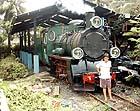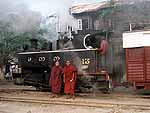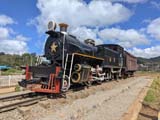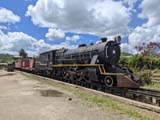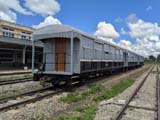Cambodia Index
I have now added a list of preserved steam locomotives in
Cambodia (21st March 2025,
sorry link omitted previously!).
Cambodia was briefly fashionable as a steam tourist destination in 1999/2000
(see below) since when it has seen relatively few visitors for steam. Michael
Pass reports (16th March 2012) that 231.501 has
been overhauled and steam tested and will work a tourist special train towards
Takeo on 18th March 2012 - tickets for which were sold out almost as soon as the
trip was announced, not surprisingly as they were just USD 15 each and there is
a large expatriate community now always looking for something new to do. Michael
has now sent a report on the start of the day's
activities (19th March 2012). PTG tours chartered a train here on 26th March
2014 and I have uploaded a photo report (3rd
April 2014). There is a
short YouTube video available (13th May 2014).
Later Hans
Hufnagel tells me (29th October 2005) that the only
working steam locomotive, 231.501, needs heavy repairs for which there is no
money.... For an illustrated report on Cambodia's railways on a December 2006
visit with information that confirms this see http://www.phantasrail.com/cambodia.htm
(added 23rd July 2007, link found broken on 27th October 2017). James Waite stopped off here in March 2008 and found the
railway staff friendly but the railway still
steamless (13th April 2008).
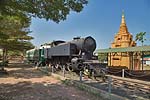 |
It came as a considerable surprise to me to hear from Paul
Stratford that there was an incomplete 2-6-2T preserved next to a pagoda
at Triel on the Siem Reap - Phnomh Penh main road because it was generally
assumed that all locomotives bar the 231 Pacifics and 131.06 had been scrapped.
It looks newly plinthed and where it has been since enthusiasts started to visit
the country some 20 years ago is unknown. Maybe there are other survivors
lurking... (4th January 2020)
|
 |
Andrew Robinson was
here in early 2005 (report added 21st May 2005) and
although he was unable to gain entry to the shed because it was a public
holiday, he was told that the steam stock is still intact. It seems unlikely that there is much work if any for
steam here, especially as the Chinese are delivering new diesels, which won't
last long unless they have done some work on the track since I was there. One change is that the
Franco-Belge 1912 2-6-2 131.06 previously in store has now been stuffed and mounted near the station (I wish
they had chosen one of the surplus Pacifics as this delightful beast will
rapidly deteriorate in the open). Further, Hans Hufnagel has told me that he ran
trips here in 2001, 2003 and 2004 and that the only steam locomotive available
was still 231.501.
|
The Foreign Correspondents Club of Thailand ran a public
excursion on 5th February 2000 (8th February 2000) and had planned a further more
ambitious tour between December 1st and 4th 2000. Floods in the country forced its
postponement to January 18th to 21st 2001. I am not sure whether it finally took place.
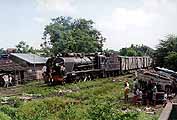 |
It had long been known that there were serviceable steam locos in the country - the
problem was getting them to work, not least for security reasons. Florian Schmidt succeeded (5th April 1999, pictures added
17th June 1999). And I joined the first ever (contradictions gratefully received) steam
tour group (again organised by Florian) here in November 1999 - read my report (9th December 1999) - another railfan tour group visited in January 2000 (9th February
2000). I have had some comments on a 1990 trip by Colin
Martindale (added 17th December 1999). Probably the last gricer to see and ride with real
steam here was Olaf Güttler in 1991 - contradictions
gratefully received. |
China Index
In general, this site no longer carries current China steam reports - if
you want to know why then click here. However, all
the old reports on this site are still available - click
here for reports from 2000 to 2005.
For a useful summary of
Chinese steam activity in 2006, read what Bernd Seiler of Far Rail had to
say (30th June 2006). Looking back further, I also have a number of reports
dating from 1996 to 1999 available, although most no longer have their
pictures.
Paul Molyneux-Berry was told on arrival at Shibanxi in late
August 2012 that the Jiayang Company has bought the small coal mine at
Huangcun with a view to turning it into a museum. Coal production is scheduled
to cease on 31st August 2012, presumably there is a possibility that the steam
powered coal trains will run for a day or two longer to clear any remaining
coal in the bins (23rd August 2012). Wilson Lythgoe confirmed their demise
during November and reported new bright blue (Darjeeling ++) tourist coaches
in use with variously black, yellow and green painted steam locomotives. The
basic passenger service is down to three trains a day and the new Bagou
station looks like a cross between a church and a supermarket. Not many more
gricers will bother to go to the railway now, I certainly won't be going
within 1000 miles of it (19th November 2012).
I've seen the pictures but I'm not going to sully my web site by uploading
them. Now (5th October 2021) Trevor Heath tells
me that an unconfirmed Facebook posts states "Jiayang Narrow Gauge: Five C2 locomotives remained at service on this line. Local residents service has been cancelled in August 2021 with bus services. All trains are tourist trains (CNY80 each way)."
It seems that Shibanxi now has (or rather will have) a
'rival' preserved steam railway, this one is just south of Zhengzhou, read Ichiro Junpu's
report (25th June 2016) : http://www.kii762mm.com/modules/pico/index.php?cat_id=212
and http://www.kii762mm.com/modules/pico/index.php?cat_id=213.
 |
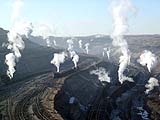 |
I make occasional exceptions to this rule such as my own visits to the
transformed near-tourist railway at Shibanxi - click here for the
latest report (updated 7th April 2011).
Otherwise we went in November
2007 to Jalainur/Zhalainuoer (updated 15th November
2008) and in December 2008 to the Xingyang
Brickworks Railway (updated 29th June 2009). The big pit at Jalainur was living
on borrowed time, reports on
SY-Country indicated that it would be all over by August 2009 (6th
March 2009), although in practice it lasted almost till the end of the year.
|
 |
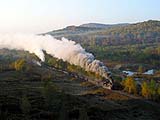 |
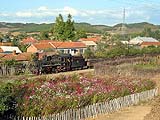 |
Yuehong and I have now got a little more time to travel again for steam,
the number of locations shrinks week by week, click here for some pictures
from one of our
expeditions, far left. (9th December 2007).
Sights like this in Huanan, Heilongjiang were
still available up till 2011, but the welcome for your wallet was warmer than
for you. |
The following represents a good starting point (links added 27th
April 2007) for those wanting to know more
about Chinese steam in the 21st Century. Some are mainly pictorial, others
include background information including the dreaded 'modern traction', not to
mention the model railway scene. Often they contain links to further sites.
-
SY Country - for the latest
trip reports the successor to QJ Country.
-
QJ Country - now history - Florian Menius's work,
the link no longer works
-
Railways of China - Robin
Gibbons home page. (http://www.railwaysofchina.com dead by October 2014)
-
Railography
- The successor to 'Tractive Efforts' by Duncan Cotterill
-
Hong
Kong Railway Society - website gone by 12th April 2018
-
China
- the last great steam show - by David Longman
-
China Rail
Gallery by John Day http://www3.telus.net/ChinaRail/ dead
by December 2021
-
Chinese Railways Website
by Peter Haworth (currently pictures only, reports will be reinstated at
some stage) (amended 30th December 2021)
-
Steam and
the Dragon by Brian Hawkins (new link 7th August 2011))
-
Narrow
Gauge Steam in South China in the 1980s by John Athersuch (added 17th
March 2008)
And if you are travelling independently, then Duncan Peattie's English
version of the Chinese Railway Timetable is what you need, check his site
for the latest available version. Another essential companion is the Quail China Railway
Atlas - the 3rd edition is now available - see http://www.quailmapcompany.free-online.co.uk/
(23rd June 2008).
Going, going, gone..... CNR steam was a mere 602 active locomotives on 1st
January 2001, down from 1014 a year earlier, advises Florian Schmidt (26th September 2001)
- of course this does not include industrial steam. Now it is effectively gone, (23rd June 2003) Zhang Xin Sheng
told me that the Wuhai/Jilantai line was dieselised on 20th June 2003.
Henry Posner III (28th May 2007) updates the QJ
export story (see below) - Railroad Development Corporation has found its first third party buyer for the Chinese QJ 2-10-2s that it has been marketing since mid-2006. R.J.Corman Railroads has signed a purchase agreement for a QJ to be overhauled in the next several months at the Jinzhou 701 workshop, under subcontract to RDC by Multipower
International, arrival in the USA is expected late summer 2007. The ultimate destination is R.J.Corman's Kentucky operation, where it will be used for special events.
RDC Chairman Henry Posner III commented, "Our next objective is to find homes for the other 2 QJs stored at the 701 Factory."
RDC consultant Dennis Daugherty will supervise the overhaul, just as he did for the first 2 QJs which are currently stored and available for charter work.
Henry Posner III told me that the third QJ mentioned above (7040) will be
shipped to the USA from Dalian in late October 2007 (20th
October 2007). QJ 7040 has now arrived at Corman's Central Kentucky base in
Lexington.
There are several pictures of it available on http://www.railpictures.net/showphotos.php?locomotive=Steam%202-10-2.
It is in the shops for complete repainting as of 15th
April 2008 "It is black Imron epoxy enamel with a 2 foot red stripe from the tender to the pilot. It is edged with 2 inch white stripes and on the tender the RJ Corman name is spelled out on the red in white lettering. Underneath, on the black, it says Central Kentucky Lines in white lettering. The wheels are now black. The paint job on the engine when it arrived was over about 4 layers of dust, rust, and crud. Corman planned to spend one day prepping the locomotive and tender and then another 2 days to paint it. It's taken them 2 weeks to finish the tender.
Joe Holbrook has been doing much work on the engine, including completely rewiring it and fabricating the class light mounting system for the boiler top. It has been under steam several times testing back and forth in the yards. Matt Schwerin stated they've probably put 20 miles on it just doing this. There were many steam leaks to be taken care of and they're still finding more.
A late April debut is planned." Thanks to Alton Lanier and Thomas Schultz
for this update. For regular news of the RDC QJs see this official page http://www.rrdc.com/news_QJ.html
(added 3rd May 2009).
In April 2000, I reported that China was again about to export second hand locos (to
Canada), I am not sure what happened to that project but Geoff Noon sent me a
picture of JS 8419 which did make it to the USA (14th
November 2003) to which I added Raymond Lillie's picture of an SY
in the USA. (updated 11th September 2006). In 2005/6, Henry Posner III purchased and
overhauled 2 former Jitong QJs 6988 and 7081 and shipped them to the USA - see http://www.rypn.org/RyPN/briefs/viewbriefs.asp?filename=060422111818.txt
for a report (27th April 2006). Wayne Weiss adds (22nd
June 2006): "Photographed the 2 QJs being offloaded in Houston Sat evening June 10th. They were loaded on flats at shipside. The locos were loaded on QTTX 8 axle heavy duty flats and the tenders on standard 60' BNSF flats. Several days were spent tying them down and getting approval of the loads. They now sit in
BNSF's South Yard (Houston) and will probably head south to Alvin then Northwest through Sealy and Cleburne and Fort Worth. Destination is Silvis where they will be offloaded and taken to Iowa City, Iowa where the FRA inspectors will be shown and look at anything they want. Then there will be a couple break in freight runs for invited guests and potential buyers, Henry Posner III who bought them doesn't really have a potential tourist operation on his Iowa Interstate RR (old Rick Island main from Chicago to Omaha). The locomotives were fully rebuilt at the ex military 701 locomotive factory near
Nanpiao (not on the Nanpiao Coal Railway) with new flues, superheaters and circulators, new spring rigging, 3 new axles each (the US does not allow axle turning which they do in China).. New crown brasses were installed and the driver tires were turned, they trued the crankpins and installed new brasses, The cylinders and valves were bored and the pistons and valves got new rings and the feedwater heaters and pumps were rebuilt. The tenders were lifted and the tender trucks were fully reconditioned. They are like new and ready for years of service. They are being offered for considerably less than most lines spend to refurbish an engine every 5 years."
Alan Crotty points out that pictures
are available. Now, Henry Posner III tells me there are pictures available
of 6988 on a test run in Iowa on 6th September 2006 - see http://www.iaisrailfans.org/gallery/BICBwith6988,
Trevor Heath adds that 7081 hauled a short freight unassisted on 9th September
2006 http://www.iaisrailfans.org/gallery/Recent
(added 10th September 2006). Both the QJs worked a further (very long!) revenue freight on 9th
June 2007 reports Henry Posner III - read a
full account which includes a link to a video clip of the action (9th
July 2007).
China Rail Publishing House in Beijing currently has two books of special interest. The
first (added 13th September 1999) is "A Survey of Steam Locomotives", published
by the China Steam Locomotive Association in October 1998 (in Chinese and English). The
price is Y88 for soft cover and Y108 hardcover. It is also readily purchased in Da Tong
where the Association has its headquarters. CRPH now has bilingual "A Picture Album
of Steam Locomotives in China, 1876 - 2001", ISBN 7-113-04147-7, a much larger volume
at Y288 (don't be put off by the price it is a great book), which includes many pictures
of early locomotives (don't trust all the descriptions though!). It also shows a number of
preserved locomotives, including those which were then in the Science and Technology Exhibition Hall,
Ministry of Railways, East Beijing, but are mostly if not all at the Railway
Museum, see below. Note
that the easiest way to get to CPRH is to board a 59 bus at its northern terminus at
Qianmen (on Metro circle line) and ride it to its southern terminus which is next to the
southern moat, west of Beijing Nan station. CPRH is just a few metres back. Don't expect
anyone to speak English here. I think it is generally accepted that taking a taxi instead
of a bus will not save any time! (added 9th January 2002)
Being almost exclusively interested in 'real, live' steam, it took me about 4
months to realise that the new Beijing Railway Museum at Chaoyang is just 20
minutes walk from my wife Yuehong's apartment in north-east Beijing,
the museum is open 09.00 to 16.00 (not Mondays), admission is Y20. Robin Gibbons
former home page (http://www.railwaysofchina.com, link now dead) had a list of
preserved steam locomotives in China. It would be accessible via http://web.archive.org/.
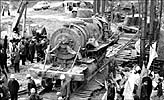 |
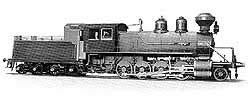 |
An unlikely source of a
museum locomotive (29th March 2005) may be the
bridge over the Lalin River on the border between Jilin and Heilongjiang as
reported in the newsgroup Steam_in_China Steam_in_China-subscribe@yahoogroups.com.
Based on reports appearing on the internet in Chinese it seems that one of the 5
foot gauge Baldwin (#16117) built Vauclain compound 2-8-0s for the China Eastern
Railway between 1898 and 1900 has been found more or less intact in the river
bed having been buried under layers of silt for around 70 years. It is,
after all, the second oldest steam locomotive in China and created a lot of
media interest including live TV coverage of the excavation.
|
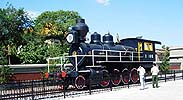 |
 |
It has now been sent to Changchun for restoration and eventual
display, its initial destination was the Changchun Puppet Imperial Palace (updated
8th May 2005). The first picture above left (22nd
April 2005) appeared in the China Daily, the second above right (courtesy of Chris
Walker, 4th May 2005) shows how the locomotive will
have looked when delivered (26th July 2005). Later news (31st August 2006) from Zhang Lantou
is that the engine (but not tender) has been cleaned and painted and put on
display. Now (18th September 2013) a picture shows
it has gained a
tender (http://english.peopledaily.com.cn/102774/8383664.html - link broken by
July 2020), thanks to John Raby for this.
|
China was home to trams in Changchun, Dalian and Anshan. The Changchun system is
effectively converted to a light rail system and now (29th August 2003) I hear the Anshan
system has closed pending the same change. The trams at Dalian, I understand, are still
operating....
Cook Islands Index
Fiji Index
Fiji finished with steam in the sugar mills in the early 70s.
its main claim to fame being the 'Free Train'. Although several steam
locomotives were reported preserved, the numbers on the island have steadily
dwindled although two are now safe in the UK. Even the latest unexpected survivor will most likely not to be left to
rust in peace. Read more about the sad story
(updated 22nd May 2014 with a happier couple of
pictures).
"Cane Train" by Peter Dyer and the late Peter Hodge
is a marvellous account of the railways here. Published by the New Zealand Railway & Locomotive Society Inc.,
in 1988 it is still available from them www.railsoc.org.nz.
The Fiji Sugar Corporation has 'borrowed' the images from the book which provide
a taste of its contents http://www.fsc.com.fj/history_of_sugar_in_fiji.htm
(Link broken by December 2021) (6th October 2012). John Browning has posted a blog
of his September 2012 visit necessarily it is not a 'steam story' - http://trainrover.blogspot.co.uk/2012/08/tuesday-august-28-2012-bula-welcome-to.html
(added 19th October 2012).
See also https://de.wikipedia.org/wiki/Liste_auf_Fidschi_vorhandener_Dampflokomotiven
and https://www.steamlocomotive.info/country.cfm?which=fiji
(links added 21st March 2025 courtesy of George
Ferguson).
Indonesia Index

|

|
An Indonesian Photographic Archive?
Your help needed.
(10th November 2011)
|

|

|
|
PNKA
Steam Locomotive Diagrams - now available! (2nd March 2012)
4 more Diagrams (13th December 2025)
|
|
Celebrating
50 years of PNKA Power Parade
It's now 50 years since Dusty Durrant's
classic book appeared and I've assembled some 250
pictures (black and white, of course) showing all the classes in the
book and several more too!
Rare new picture added 13th December 2025.
|
Java 2025 definitely saw the
Pagottan fireless conversions at Pagottan working the mill yard, that was
probably as far as it got except for possible private steam charters. Amazingly,
diesel hauled field trains survived at Kedawung, Semboro and Wringinanom - the
latter operation was best described as shambolic (20th
August 2025).
It seems that the only
reliable day-to-day steam activity during the 2024 milling season would have
involved the three fireless locomotives at Pagottan. However, local enthusiasts
arrange charters (Madiun area and Semboro) from time to time and reports,
pictures and videos appear on social media. For those very few (potential)
visitors whose interest extend beyond steam, it is sad to report that, by the
end of the 2024 season, the number of mills with (diesel) field working was
probably just two - Semboro and Wringinanom - and the state of the track at the
latter continues to be a cause for concern with frequent derailments. Jatiroto
appears to have finished with those remaining diesels that can move themselves
(or be towed) transferred to Semboro. Kedawung had stated its intention to
finish field working by the end of the season (24th
September 2024) but later news is that some will have a reprieve (8th
May 2025). Now a Youtube video (https://www.youtube.com/watch?v=mkHb2-hXtSY
indicates that the mill at Rendeng on the edge of Kudus is still using 8km of
its field lines (26th May 2025).
After a one year gap, local
reports indicate that there has been a minor and no doubt temporary steam
revival. Jackshaft locomotive 10 Salak has been in use at Rejosari sugar mill
near Madiun, East Java, apparently owing to a motive power crisis with their big
Japanese diesel out of action. There will no doubt be other videos floating
around but this is the one that alerted me to the situation - https://www.youtube.com/watch?v=65SEsTtcRxI
(31st August 2022). Peter Haworth was also
lucky at Purwodadi on 1st September 2022 (report added 15th
September 2022). Now Galuh Wajid As'adi tells me (7th March
2023) that
Rejosari 6 has also been restored to service and will presumably be used in the
forthcoming season. Here is a video - https://www.youtube.com/watch?v=nGdokyAWftI&t=88s
The main steam attraction of Java revolved around the
sugar mills which in 2010/11 still operated up to 30 narrow gauge steam
locomotives within the mills and in just one or two cases regularly out into the fields. This
made it, after China, number 2 in the world for real working steam
locomotives, although numbers declined every year and the glory days are over.
The reduced numbers of independent travellers attest to it with groups having
to organise more and more 'plastic' events, just as in Cuba. In the days when I
used to run tours and was an annual visitor I used to put up detailed reports,
but in 2013 I received just one report from an independent traveller. If, like me, you've known and loved the island for well over
30 years, probably you will have no ambition to expend a lot of money and energy
photographing what is left. But if you've never delved into
the sugar mills and are broad minded enough to enjoy the 'critters' too then my
favourite island explored independently should be on your list of things to do
before you die. I did think that one day I would be back for a last look, but I
now know that it will never happen.
Ducroo and Brauns Sumberharjo 9 and Pesantran 214
have been repatriated to the Netherlands (31st March 2023).
At the other end of the stick, Krebet Baru 10 has been scrapped, despite having
been apparently preserved under cover for a long time. (14th
November 2024)
|
Purwodadi continued to use steam during the 2020
season but the only enthusiasts who will have seen it working would have
been local ones. However, reports state that only tractors and diesels
are working in 2021 and this marks the end of 'real conventional steam'
in Indonesia, a very sad occasion for me with my personal history even
though I haven't been to Java for over 10 years. However, the three
firelesses at Pagottan nearby are all working. (All this added 4th
June 2021.) The least said the better about 2019, charter steam
was near impossible, Semboro did not use its firelesses but Pagottan
did. I believe steam continued in use at Purwodadi (20th
February 2020)..
2018 seems to have been very similar to 2017 in that
real steam continued with conventional locomotives at Purwodadi and
fireless locomotives at Pagottan and Semboro. Visitors were able to
charter steam locomotives as before at Olean (but maybe not at Semboro)
and a new opportunity was presented with the reactivation of Kedawung
12, not that the results were guaranteed in any case and authenticity
was definitely in the eye of the beholder. Throw in the tourist trains
at Tasikmadu and that's it, not enough to get more than a handful of
enthusiasts to visit, they would have been those who also appreciate
marrow gauge diesels or stationary steam engines in the mills. In the
Madiun area at least, the season finished in early September. Note that
the mills at Sumberharjo and Kanigoro are reported as closed. (10th
October 2018). |
|
After a disastrous season in 2016, I was prepared to
hear that Purwodadi had succumbed and abandoned steam. However, a
locally posted picture from early June shows one of their locomotives
crossing the main road so it seems it still survives. Of course the
fireless locomotives at Semboro and Pagottan will no doubt keep steam
alive on the island for some time to come (10th
July 2017, thanks to Aditya Budidarma for this). August visitors
report 'no change' from the above (23rd August 2017). |
|
It seems the 2016 season was rather late starting as
mills tried to avoid harvesting during Ramadan. My expectations of steam
did not go any further than the fireless locomotives at Semboro and
Pagottan but YouTube videos from local enthusiasts https://www.youtube.com/watch?v=S1BpG5ZOCAo,
https://www.youtube.com/watch?v=9B2aYv956Yg
and https://www.youtube.com/watch?v=DLWGfnrNwjo
seem to be recent and suggest that Purwodadi at least is still using
steam. A similar search for Kanigoro nearby drew a blank. I hoped for a
first hand report but it never came..
A local report on Olean from late July 2016 (click
here) suggests that there is no regular steam any longer with just
one locomotive serviceable which can be chartered fro Rp 2,000,000 or
roughly USD 150) A local report suggested that many of the old mills
will be closed at the end of the 2016 season but confirmation has not
been given. Kanigoro did not work in 2016 and is unlikely to mill again,
it has long been under threat. |
 |
The 2014 Java sugar season
came and went (final report 1st November 2014). It is no longer the darling of the tour
companies. I summarised the
steam news (as above), but John
Raby ran a blog of visitors' experiences which is necessarily
diesel orientated with some steam content (8th
August 2014).
I 'opened' the
2015 Java account, with a summary of likely steam operation. I have
now adjusted the reports to reflect what
I believe was the end-of-season situation (28th
September 2015), which in historical terms was nothing short of
disastrous for real steam although for those willing to accept charters
as a substitute, there was some consolation.. |
For more information looking back, follow
these links:
And if you are a masochist and want to know what
you missed, then my Sweet Dreams pages show
steam in all its glory between 1975 and 1997 and now you can see them on video:.
 |
For many years, the 'Jewel in the Crown' of Java sugar
steam
was Olean mill near Situbondo, in East Java.
Uniquely, it combined
daily steam in the fields AND
a mill operation which used around forty
stationary steam engines.
You can relive
those days on our
Sweet Spot DVD.
Don't take our word for it, you can read Keith Chester's Review.
|

|
And inside the mills there is a mass of ancient
stationary stream power too.
Long ago, it was the Iron Dinosaurs of the PJKA/PNKA that turned
me into a fulltime international gricer and there are two open air museums in
Java with representative collections:
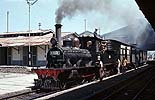 |
Those who like to dream will welcome the news that PT
KAI has
offered to re-open the Madiun to Ponorogo line, anyone for B5004
from Taman Mini, Jakarta to return to its old haunts?. The picture
shows B5001 at Madiun in 1976 - there are more pictures of this line
in the good old days on this site (29th
January 2013). |
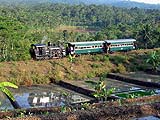 |
 |
The Ambarawa Museum includes an operational rack
railway, run by two B25
0-4-2RT (far left). The line north-east to Tuntang has now been upgraded and can
take steam again. Day to day services, however, will be run by D300.23 reports
Tjahjono Rahardjo (5th November 2010). The museum reopened after a long period
of closure for rehabilitation on 1st October 2014. For a look at the new
Ambarawa, take a look at Damar Ananggadipa's
report (8th January 2015).
For a while it also had an active conventional steam locomotive C1218, newly
restored and working its first train for overseas enthusiasts in August 2006
(left). A
proud moment for me as I helped organise its rescue from the back of the shed at
Cepu a few years back. Click here for more
pictures.
|
 |
 |
C1218 went to Solo where it launched a
tourist service on part of the Wonogiri branch commencing 17th September 2009 (12th
September 2009). Far left is C1218 on a test run on 13th September 2009 (15th
September 2009), the picture by Yuda Nugrahadi was originally uploaded to
the Yahoo Keretapi Group, click
here for more pictures (19th September 2009). I have now ridden
the train myself, fulfilling a 35 year old dream (15th
May 2010), see next left. The street running down the main drag, Jalan Slamet
Riyadi, is challenging for photographers and especially videographers, but we
featured a charter here during
our 2010 Java tour. In April 2012, the local authority decided to cease
funding the train, so I guess at some stage the loco will return to Ambarawa (21st
August 2012). However, in March 2013, Railpage
Australia reported that there had been a change of heart and the service
would now continue (26th March 2013). The train was
relaunched on 10th March 2013 - see this video http://www.youtube.com/watch?v=PD4LN5zsE8o
and http://www.youtube.com/watch?v=fv6INGqJ_iY.
|
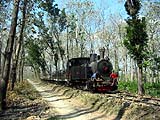 |
The other preserved steam
operation has been on the Cepu Forest Railway, a great day out especially when the tourist coaches
are left behind and and something resembling a 'real' train operates. Up to 2005
this worked pretty reliably - see my report of one such
visit (21st August 2002), but since 2006, the railway has suffered from
intermittent closures owing to rainy season damage but despite an organisation
which is best described as shambolic, the railway has managed to operate charter
trains for visiting enthusiast groups in recent years.
|
Back on the 27th August 2015, I was alerted to
the fact that D1410 and D52099 had been moved from Taman Mini to Yogya Works for
restoration to running order. Then things went very quiet although after a while
YouTube videos appeared that showed D1410 making steady progress. Now D1410 is
out and about and it had a grand public first run through the streets of Solo on
16th February 2020 (https://www.youtube.com/watch?v=z0UxSBJfa-s).
Earlier it had a run from Lempujangan to Purwosari (https://www.youtube.com/watch?v=XktQeFFMlns).
Michael Rinto's videos, linked above, are the best I have seen but there are
many, many more out there. I don't know how work is going on D52099, this class
was said to have had dodgy boilers around the time they came out of traffic
nearly 40 years ago. All this added 20th February 2020.
E1060 from West Sumatra was at Ambarawa (but only working
on the flat) for 10 years between 1998 and 2008 but has now returned to its
former haunts for the new Sawahlunto Railway Museum - where the coal mine for
which the railway was built was sited (30th November 2008). Click
here for more outline information on developments in West Sumatra (5th
March 2009), but for a comprehensive report, read Thomas
Kautzor's account of a visit in June 2010 (15th July
2010). I was here in late 2012 and you can
read my report, basically E1060 is usually serviceable but is only steamed
on special occasions and for charters (4th December 2012). After some years out
of action, as of June 2016, E 1060 is again a 'runner', there are YouTube
videos and a
local report, thanks to Steve Mourton for picking this up (27th
March 2017).
Apart from Java, there was still a little steam in the Oil Palm Estates in
North Sumatra into the 1990s, I have added some archive photos (21st March 1998), but a German group
visited (26th August 1998) and found only Dolok Sinumbah (2 locos shunting out of 5
serviceable) and Dolok Ilir (1 loco shunting out of 2 serviceable) had active steam.
Certainly, I gave up on this after my 1993 visit. Geoff Warren found only a
few preserved locos on a 2008 visit (29th August 2008),
Joachim Lutz was here a little later and fills
in most of the gaps (1st October 2008). I visited Medan
in January 2017 and found two of the preserved industrial locomotives had
moved there (21st January 2017). Now (6th October 2023)
Marc Stegeman tells me that a previously unknown 600mm gauge DB 0-8-0T survives
preserved at SIPEF's oil palm plantation at PT Tolan Tiga at Perlabian (see www.ducroobrauns369.nl).
It's perhaps not surprising that I had never heard of it as it's at Perlabian,
40km east of Rantau Prapat, the southern extremity of the Deli Railway.
Japan Index
Historically, I have not covered Japan in detail
but James Waite's April 2015 visit has provided a very useful entry point. Read
about his visit to the Oigawa Railway, within
are links to a four further reports as well as information on railway museums in
the country. Thanks are due to Takahide Yamamoto for background information and
some of the material used (14th May 2015).
For an excellent, comprehensive English language
site which includes details or many railway museums, see http://steam.fan.coocan.jp/index.html
(original link noted 14th May 2015, found broken in October 2017, and now
corrected (21st October 2018).
Laos Index
The only railway ever built in Laos (prior to the
recent extension of Thailand's north-eastern line) was used to transport goods around rapids in the
Mekong River on the islands of Don Det and Don Khone. It was 7km long and abandoned at the
end of the Second World War. For some time I carried a picture of a surviving locomotive,
Hans Hufnagel has been here and I have posted a report of what he
found (2nd January 2004). Thomas Kautzor now points out that there are the
remains of two locomotives here, the previously reported metre gauge locomotive
probably was a wartime arrival and the second an incomplete small Decauville
0-4-0T. Both are shown on this page http://www.asienreisender.de/siphandon.html
(13th December 2013, link found broken on 27th October 2017).
Mike Pass has been researching this railway over
the last couple of years and has paid more than one visit to it. On the island
of Don Khone, he confirms that the more complete locomotive at Ban Khone Tai is
metre gauge 0-4-0T OK 4650/1911. The second locomotive is at Hang Khone at the
southern tip of the island and is a 600mm gauge 0-4-0T Decauville. Mike has
prepared a fascinating report on the railways of this country, past and present.
If you would like a copy (4Mb) send me an email and I will forward it to him (15th
January 2015).
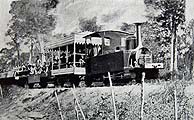 |
 |
Mike would appreciate help with identification of
this third locomotive shown in the two pictures on the left (click to see full
size). It may be a Couillet supplied to Decauville. Please email me any
responses (16th August 2020). It was a 7-tonne metre gauge 0-4-0T locomotive supplied by the French Decauville Company to French Indochina
in or before 1897.The photograph on the left is circa 1897 and the postcard on
the right dates from 1907.
|
Malaysia Index
Bernard Loughlin took a fine collection of
pictures in the area south of Kuala Lumpur and Gerry Nicholls has arranged for
many of them to appear on http://searail.malayanrailways.com/BL/BL.htm.
It includes some rarely photographed steam classes as well as the Sentinel steam
railcars, highly recommended (8th November 2016).
Long ago (1972-9) I lived in Penang, Malaysia. I have 2 children and a set of
nameplates and numberplates from 563.09 to show for it. I saw the end of steam there and
enjoyed the early preservation scene. I even drove a steam loco from Seremban to Port
Dickson and back in 1987. In the mid 1990s there was a report in an Indonesian newspaper
about a proposed steam-hauled tourist train from Gemas to Tampin, but I gather it was not
a success and did not last very long. I have added some historical
background to 564.36 Temerloh and the Malayan Railway, provided by Fergus Moffat (22nd
February 2001). Andrew Bremner has provided some pictures of
the restoration and rolling stock (11th May 2002).
Zakaria Bin Yusof told me that "a few months ago in 1997, I saw that steam loco at the KL
Railway Station during a joy ride for the school children." Does anyone
have any further information? On 16th December 1999, I was told by KTM that
their steam engine was not available for charter 'for technical reasons'.
However, Brian Garvin reported to the Continental Railway Circle News Group that
he was told by a loco inspector on 13th February 2006 that 564.36 was fully
operational if in need of a steam crew and some tender loving care.... (added
9th March 2006). Since when the locomotive has had a repaint for a celebration
of 100 years of railways in Gemas. See http://www.ktmrailwayfan.com
for information - this site also has some nice historical pictures if you hunt
around among the diesels and other crap (link added 11th
September 2006). Latest (and very interesting) news from Thomas Kautzor is that
564.36 has been moved to Johor Bahru with the intention of returning it to working
order to operate steam specials in the south of the country
(21st May 2010). However, Mark Torkington reported (14th November
2010) that it has been sent instead to a new railway museum/display to be
established at the new Johor Bahru Sentral station (along with a couple of
vintage diesels from the 1970s).
|

|
Click here for
my list of preserved steam in West Malaysia - (final two pictures added 3rd
April 2013). There is now (29th January 2025) a
similar page for East Malaysia.
For up to date information on the Malayan Railway, check out http://www.keretapi.com/
(link dead by 12th April 2018). For more historical information see
Malcolm Wilton Jones's site http://members.lycos.co.uk/railsing/
and http://searail.mymalaya.com/ http://searail.malayanrailways.com/
(amended 6th July 2015).
These links were originally added on 15th December 2005.
|
|
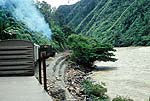
|
Meanwhile in East Malaysia, Victoria Hilley sent me information about the tourist North Borneo Railway project (December 11th 1999). Briefly
as from January 22nd 2000, there were twice weekly trains for
individual travelers (FITs), scheduled for Wednesday and Saturday departures at 10:00am,
with return by 14.30. Journey is between Kota Kinabalu, Tanjung Aru station, to Papar
station and return (66km), with the train available for private charters on a 7 days
notice basis.
It was officially launched by the Chief Minister of the State on 22nd January
2000 (24th
February 2000) and their own web page
is now available (20th April 2000). Following which there were a number of
visitors including Hans Hufnagel in
July 2000, myself in January 2001 (with steam
up the Padas Gorge to Tenom - final pictures added 2nd February 2001) and John Raby
has also been here (added 21st
February 2001).
|

|
James Waite has sent some
background information (including a steam loco list) of this relatively
unknown railway (7th February 2013).and told me
that by May 2006 the train was running on Monday, Wednesday and Saturday with 6-016 instead of 6-015 which
needed some repairs, rather belatedly I have now uploaded his
illustrated report with pictures of four different outings (7th
February 2013). For some time services were
suspended (at least on the coastal section between Kota Kinabalu and Beaufort)
while the railway was given a much needed make over. Re-opening was repeatedly
put off, during that period John Douglas reported that 6-015 and 6-016 were under heavy overhaul (17th
January 2008) - picture below left. For news of a March 2010 visit click
here (6th June 2010).
|
|

|
The railway restarted steam services on 4th July 2011 (30th
June 2011). For then current information, click the North Borneo Railway link on http://www.suteraharbour.com,
there are reports on their preparations blog pages http://suteraharbour.com/blogs/
(Link dead by May 2023).
Despite what has appeared at various times and in various places, the NBR have
confirmed to me that the trains will initially run TWICE a week on Wednesdays
and Saturdays (1st July 2011). At RM 250 (GBP 50) even including
breakfast and lunch, it's not cheap. Chris Jeffery was here in September 2011
and confirms everything was as before with 6-015 running and 6-016 waiting for
spares (20th September 2011), while Chris Yapp has provided an
illustrated report which also shows facets of the 'new railway' (27th
December 2011). Since when the operation has continued unsung, Aditya Budidarma Cholisi
visited in March 2018 and found that only 6-016 was remotely serviceable (and
that failed just before departure). 6-015 has been functioning as a source of
spare parts and 6-014 has been abandoned at the old Kinarut works. In other
words, it's no longer a long term sustainable regular operation (15th
April 2018). Malcolm Wilton-Jones suggests that 6-014 was actually at the 'new'
Kinarut shed built in 2015 so the original complex could be used for the new
mega transport interchange. Looming is 6-016's boiler ticket expiring in 2021
and 6-015 will have to be made serviceable before then... (30th
November 2018). It seems that the service was suspended during the pandemic and
was not restarted afterwards (21st September 2024).
|
Mongolia Index
Colin Young saw a small open air museum in passing in Ulaan Bataar in 2006
with at least three steam locomotives (one was a P36). Torsten Schneider has provided more information
and some pictures (2nd December 2008). John Middleton has since sent a
further complete set (27th November 2014) to which I have added a summary of
the steam locomotives present (29th January 2025).
It seems that L 3634 is in working order, there
are several pictures on the web of it in action for the celebration of 65 years
of Mongolian railways in early June 2014, for example see https://www.flickr.com/photos/batkhurel/14156933129,
https://www.flickr.com/photos/batkhurel/14614956779 and http://www.flickr.com/photos/54330726@N08/14226102340
(8th August 2014) (All links broken by January 2024. RD). Thanks to Thomas Kautzor and
Heiko Mueller for this. John Middleton tells me (27th
November 2014) that L 3634 has been returned to Russia.
Myanmar
(Burma) Index
There has long been a need for a railway history of Burma
which has now (8th November 2024) been satisfied
by a new book (see above). Use the email address to contact the
publisher directly for ordering information.
Don't hold your breath time, but the new
government in Myanmar has declared its intention to rebuild the 'Death Railway'
at least from Thanbyuzyat to the Three Pagodas Pass, see http://www.irrawaddy.org/archives/4338
(16th May 2012, link dead by 26th April 2014).
British built YB and YC 4-6-2 and YD 2-8-2 were still at work here in small
numbers well into the 21st century, although the FarRail tours newsletter of
August 2008 reports that all steam was withdrawn on orders from HQ in June 2008
(22nd August 2008). Few people visit these days so
confirmation will be difficult but what follows may well be history and bear
this in mind in planning a visit. Thomas Kautzor has provided a
December 2008 update on this depressing news (24th
December 2008).
Now in 2014 comes news on the FarRail
website (registration required to read the report) that "YD 967"
has been put through Insein Works and did a run with two coaches from Yangon to
Bago and back on 8th December 2013. Now a YC is also going through works and
will be followed by a second YD. Another YC and YD will be sent from Pyuntaza
soon. I haven't quoted numbers as these locomotives are being heavily
cannibalised. It's not a steam revival, they are said to be intended for tourist
charters which will cost megabucks, but at least it ensures for a while a safer
future for steam than seemed possible (all this 7th
February 2014) .Manfred Schoeler points out that local reports indicated that a
tender was called for to operate a steam hauled train with three coaches between
Bagan and Kyaukpadaung in May 2014. It seems that it will
happen from 16th December 2014 (Link broken by May 2023) with tickets a staggering USD 250 I think
there will be plenty of empty seats (27th November 2014).
Manfred Schoeler was in the country at the end of
2014 and has provided a review of the current scene,
it is far from hopeless but as always here don't hold your breath waiting for
action (10th February 2015). In the event, it was January 2017 when the first of
the new era charter trains for enthusiasts ran. Manfred Schoeler reports on a
successful tour (3rd February 2017).
The principal steam shed was (and will be, see
above) at Bago, some 50 miles (80 km) north-east of Yangon.
From there, irregular workings occurred along the mainline between Yangon and as
far north (probably) as Pyinmana or even Thazi and also on the branch main line
to Mottama/Moulmein. You had to be prepared for a significant gap between trains, but where
else in the world could you have seen real steam on a double track main line on a state
railway in the 21st century? Click
here for the visitor reports, essential readings if you are thinking you
ought to have visited, the last came from Shane O'Neil's June 2007 visit (23rd
July 2007),
these also contain other reports of visits to the Burma Mines Railway (see
above).
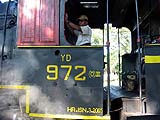 |
 |
This is YD 972 on on a freight train at Pyuntaza, 30th December 2005, the same locomotive I had seen in Insein Works
(see below)
nearly a year before.
|
|
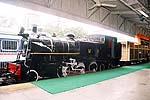
|
In September 2006, China donated 130 carriages from the Yunnan metre gauge
system to Myanmar (I rode several in early 2007 and while their condition was
better than average for Myanmar they were pretty worn out by current Chinese
standards). In return the Chinese got two ST 2-6-4T (and a couple of wagons),
reportedly one has gone to the museum in Kunming and one to Beijing. 'Bizarre'
is the word that springs to mind (23rd May 2007), the picture looks like Yangon
station to me.
|
|
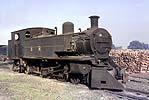
|
As 144 4-6-4T (Beyer Peacock 1916), last reported at
Insein Works in 2004 has been plinthed outside Yangon station according to a
local newspaper report (original link dead 26th April 2014),
thanks to Harvey Smith for spotting this one. This is not a class which many
visitors will be familiar with, Basil Roberts' picture, taken from our
Tiger Steam CD-ROM, shows sister locomotive 143 at Myohaung Junction shed, just south of Mandalay on 10th December 1971
|
Not strictly a 'steam' story, but there are plans afoot to relocate
the main station in Yangon, 'more eccentricity' would be the most polite
comment I could make (26th November 2007).
If you have ploughed through the above history
you may be interested in this pair of links which show the known extant steam
locomotives in the country: https://de.wikipedia.org/wiki/Liste_in_Myanmar_vorhandener_Dampflokomotiven
and https://www.steamlocomotive.info/country.cfm?which=myanmar,
Thanks to George Ferguson for supplying the links. (21st
March 2025).
Now (13th
October 2025) Miika Nicholson informs me that there is an operational
steam locomotive (YD 2-8-2 967) kept at Aung Ban which can be chartered for USD
800 with space for 70 people on board and that it 'definitely ran earlier this
year'. This is not a country that many people would want to visit these days but
I would guess that this area above Kalaw
in Shan State on the branch from Thazi is more secure than most, it being a
military town with strong British and Nepali (Ghurka) connections. Miika safely
took the train from Yangon to Kalaw and back, the branch from Thazi up the
reverses is definitely one of my personal 'Great
Railway Journeys'.
Miika also photographed preserved ST 2-6-2T 769
plinthed outside the station at Kalaw (first picture). The second picture shows
the YD and the final picture the three restored coaches, both at Aung Pan
station.
New Caledonia Index
Definitely not 'working steam' but here is a snippet from Jacques Daffis which I found
fascinating. For some background read 'Rails to the Setting Sun' by Charles Small
page 147ff:
"I don't remember if I informed you that we have repatriated Decauville steam
locomotive N° 288 from New Caledonia in July 1998. This 600mm gauge locomotive was built
1898, delivered 12.03.99. to Higgison International Nickel Corporation, Noumea, New
Caledonia. It is a 3,250 tons "new model", the smaller one in the Decauville
catalogue. At some time, the locomotive was regauged for 500mm gauge, and sold to
Société Le Nickel, New Caledonia. It worked until about 1945, and later was abandoned in
the jungle. The locomotive together with his sister 287 was rescued with the help of the
French army, and taken to Noumea with a helicopter. 287 was restored externally and
exposed as monument at the society Le Nickel headquarters in Noumea (it is 287, but with
288 plate). 288 was left rusting in a siding in Noumea. After long negotiations, and huge
help of a resident, we were able to import it to France. New Caledonia is in a process
towards independence, and it impossible to export old objects, they are
"patrimony". I suppose that it is the only locomotive coming from so far (about
20 000 km), and it is also as far as I know the only Decauville type 3.250 t in France and
perhaps in Europe.
It seems that there are other locomotives still
in existence, see https://de.wikipedia.org/wiki/Liste_in_Neukaledonien_vorhandener_Dampflokomotiven
and https://www.steamlocomotive.info/country.cfm?which=newcaledonia,
Thanks to George Ferguson for supplying the links. (21st
March 2025).
North Korea Index
Michael Bahls (see below) has sent me a
further update (22nd July 2025). Google Maps
satellite view shows a tank engine with 5 cars, again in Chongjin at 41.769140°N, 129.755223°E.
Unlike Streeview, such images are updated regularly, this one is '2025'.
The following links give what are said to be
extant steam locomotives in the country:
https://de.wikipedia.org/wiki/Liste_in_Nordkorea_vorhandener_Dampflokomotiven
and https://www.steamlocomotive.info/country.cfm?which=northkorea
Thanks to George Ferguson for supplying the links. (21st
March 2025).
Some stories just won't die. A BBC reporter
at Fangchuan in north-east China reported on 1st November 2024 that
"The whistle of a train interrupts the tourist chatter, and a steam
engine pulling a long line of freight carriages slowly chugs across the
railway bridge from Russia to North Korea. It stops in front of a Korean
sign facing China which reads: "Towards a new victory!" The
bridge is the only one connecting the two countries and is reportedly dual
gauge.
Given that steam was in use then transhipment
will have occurred on the Russian side although the website
38North suggests that there is a recently upgraded transhipment facility
on the North Korean side (2nd November 2024).
Fangchuan is the unique point at which the three countries meet. Enthusiasts
with a long memory will recall that up to the 1990s, it was possible to
observe such operations between China and North Korea at Tumen further
upstream.
sent me this fascinating email
(6th April 2020), the image is a copy I (RD)
have made, the only adjustment I have made is to apply 'sharpening'. Unlike
Streetview, the Satellite Views are updated so it shouldn't be that
old.
"By accident I found a steam freight train on
Google maps, it is at 41°46'05.2"N 129°45'58.9"E in Chongjin."

He continues with further less clear cut
examples
"and in front of the the nearby shed, which is here - 41°45'57.7"N 129°45'07.5"E
- there are two tank engines of a similar type visible; probably the 2-6-2 which pulled a special train some years ago.
At Sariwo in the works there seems to be a cold/dead steamer
here - 38°29'52.4"N 125°46'31.1"E and more probably here - 38°30'16.7"N 125°45'54.2"E
The third position looks like the same type of tank engine, and
a fourth position specifically - 38°30'16.8"N 125°45'52.7"E -shows that kind of tank engine as well."
(I've used Google Streetview to 'discover'
steam rollers but this is the first occasion to my knowledge where a live
'real' working steam locomotive has turned up. RD)
Thomas Kautzor comments:
"Those are the four 2-6-2Ts at Chongjin steelworks which are off limits to foreigners."
 |
For some year Juche Travel Service has been operating
rail orientated tours to North Korea. Keith Jones joined one in October
2015 and was rewarded with a 20km return
run behind steam (15th November 2015). |
North Korea has never been an easy country to visit and effectively
absolutely impossible for independent travellers. Many years ago there were a
few short-lived tours but since 2002 a small number of groups have visited and
the curtain has been raised slightly. The authorities seem to blow hot and cold
and news
of scrappings and an end to the trips tends to be followed by a new discovery.
There was still real working steam in the country at that time, but just how much
was
impossible to guess - bear in mind that owing to fuel/power shortages there were
very few trains of any description running! I have now moved the tour reports to a separate
page (this link went AWOL and I have now restored it, 5th November 2010). If
you consider joining a tour here then you should read them carefully, although I
haven't seen one advertised since 2005!
These pictures were taken by me in early 2003
and show standard gauge and narrow gauge charters:
 |
Several readers sent me notes on an article which appeared in the
UK Daily Telegraph on 19th September 2000 concerning
work to re-establish a rail link with South Korea which included this contraption (photo
is from Reuters, no larger version is available):
One of James Hefner's contacts notes: "...no cylinders and visible
gear, at least from the side you see on the picture as well, instead axleboxes. Spoked
wheels, nevertheless. The "boiler" has no smokebox door. And ... would be
wondering about the exhaust design, as it has two smokestacks. The "rear end"
bears a "coal box". He felt, and James agreed, that it is either a diesel with
steam bits added to it; or something built on a steam locomotive frame. It is not clear
whether it came from South Korea or North Korea. Marcelo Benoit sent this note from Kass
Franklin which seems to solve the mystery (13th October 2000)
|
" In Alfred W. Bruce's "Steam Locomotive In America" (1952)
I found this on page 369:
STEAM TURBINES FOR THE SOVIET UNION
Some very interesting mobile, but not self-propelled, steam-turbine
electric power plants were built in the United States to furnish temporary electric power
in devastated Russian areas. These power plants were mounted on railroad-car type of
underframes and trucks and could be located wherever there were rail connections. Only the
3,000-kw size as built during World War II with a conventional locomotive-type boiler is
described here.
The fuel specified was a poor grade of native lignite, stoker-fired and required a very
large grate area. The boiler was short and of large diameter. Induced stack draft was
furnished by a turbine-driven fan located on the boiler unit, with two boiler units for
each intermediate 3,000-kw plant. Each boiler unit had its adjacent conventional
locomotive tender for coal and water supply, the coal being replenished from any nearby
outcropping, and the steam was condensed. The entire power plant consisted of ten car
units, as separate car units were provided for the switch gear, turbine set, and cooling
set. In all, ninety-seven power plants were built, a total of 217,000-kw. They included
forty-seven with 1,000-kw capacity and water-tube boilers; forty with 3,000-kw capacity
and locomotive-type boilers; and ten with 5,000-kw capacity and water-tube boilers."
Philippines Index
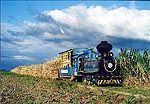 |
Negros went out of fashion at the tail end of the 20th century as working
steam here ground to a halt and I have now archived all the reports up to the
time when regular working steam finished (1997-1999). Click
here to read them. John Browning tells me (15th September 2022) that there
are recent videos of active steam on this page https://www.facebook.com/rpsuating
(15th September 2022). I have now seen a screenshot
with some pictures with the heading "The Dragon has awakened. After 25
years of inactivity, our steam locomotive was again commissioned for cane
hauling operations..." It appears to be Baldwin 0-6-0 #7. 25 years is a
slight exaggeration, I saw 'real steam' at work here in 1998, follow the link
above. Brad Peadon has been to Negros and reports on the surprisingly (for him
at least) accessible preserved
steam locomotives (4th October 2023).
|
|

|
Bernd Seiler took a tour group here in February 2007,
lots of nostalgia and American diesels, with just a smidgeon of very nice
geriatric plastic steam, see below courtesy of Hans Hufnagel). Read
about it (new link, updated with more pictures 24th
January 2013). Thomas Kautzor
also visited Luzon and Panay, no active steam but an
interesting account with quite a bit of preserved steam among the diesels...
(updated 18th October 2023, with two pictures. previously updated 12th January 2023 with news and pictures
of three locomotives in Manila, 26th January 2017 with a picture of a preserved steam locomotive, 23rd May 2013 with news of one the five
locomotives pictured in the previous update of 22nd
March 2013, information on new stock, 25th
February 2013). The repeat tour in February 2008 was not overly successful and the
end is in sight not just for steam, but all the sugar cane railways in
Negros (26th May 2008). Eddie Barnes has provided a
general update which covers Negros Occidental and Cebu (26th
January 2017, updated 14th May 2023)
|
Sad news for me as a two time visitor was the news that Hawaiian Philippine have their
3ft gauge roster for sale. I received the following email (24th April 2003) "We are a
company in the Philippines operating at least 8 steam locomotives, mostly built by Baldwin
Locomotive Works, Philadelphia, Pa, USA. Some are still operational, and others need only
minor repairs. I would like to inquire if anybody is still interested to buy these
machines. I could provide each of the equipment specifications if somebody is interested.
Thank you." Point of contact is J Cristales, email jlcristales@hpcosugar.com. I need hardly
mention that these are highly desirable beasts! The company have also provided (25th April
2003) a specification list of the locomotives (#2 was
sold recently). Colin Rainsbury tells me (23rd June 2004)
that the locomotives have now been sold. According to a report in Continental
Railway Journal (edition #142), 0-6-0ST 8 and 9 which went from Hawaii to Negros
in 1948 have returned there to run on a new tourist railway on the island of
Kauai (26th June 2005). I have heard since (12th
February 2006) that the railway expects to start operating in Summer
2006, but initially with a vintage Whitcomb diesel. Bernd Seiler visited in
April 2006 and found all work in the hands of diesels but La Carlota (one loco)
and Hawaiian Philippine (2) had serviceable steam locomotives (30th
April 2006).
A visitor to Negros in December 2010 went to Hawaiian-Philippines Sugar Company and
reports that "apparently the locos are regularly steamed on Thursdays, the only two still operating in the
Philippines" (23rd December 2010). Ralf Mandera was here in March 2011 and
reports (22nd March 2011) that 5 and 7 are
serviceable and can be steamed for visitors and that four other locomotives are
still present (I believe these will be 3, 4 and 6 the other standard Baldwin
0-6-0s and 1, the Henschel 0-6-0 RD.)
For news of a proposed new railway museum see my 'Railway
Museums in Asia' page (4th June 2010).
If you have ploughed through the above history
you may be interested in this list
of extant steam locomotives in the country, it's in German and Google's
attempts at translation produce some strange wording on my system. Very few look
good and more than a few are long term derelicts. For what is, in effect, an
alternative version check out https://www.steamlocomotive.info/country.cfm?which=philippines.
Thanks to George Ferguson for supplying the links. (21st
March 2025)..
South
Korea Index
No live steam for a long time, but on
searching the web it seems that there quite a few preserved steam
locomotives in the country.
John Middleton was in South Korea in January 2012 and his
report includes the railway museum at Uiwang and a list of known preserved
steam locomotives (3rd August 2012). I have now (11th January 2014) added
pictures from Bill Pugsley of the locomotives at Imjingak and Jeju. There is an
illustrated 2023 update from Eddie Barnes (pictures added 19th October 2023).
Taiwan Index
The Pinyin rendering of Taiwanese is inconsistent
on this site and many others. I am trying to slowly change some to those seen on
road signs on the island in 2015, but the same place may still have more than
one Pinyin form in use locally.
There are a number of active preserved steam locomotives on Taiwan including
CK101 and CK124 on the mainline. Continental Railway Journal 150 notes
that specials were run from 22nd to 24th December 2006 and again on 3rd/4th
February 2007, the latter based on Changhua (this added 23rd
July 2007, see also the earlier report below), click here
for more information and the full reports from Taiwan which includes active
preserved industrial steam (updated 27th July 2007). The two pictures on the
left are courtesy of Su
I-Jaw:
Steve Pratt has since advised that DT 668 was reported to be
resuming services from 11th November 2011 on the Neiwan railroad in Hsinchu County
(12th December 2011). Tom Schultz has sent me news of CT 273 which was last
reported at 'the Folks Valley of Taiwan, Changhua' and which has now been
restored to running condition - http://ajw.asahi.com/article/asia/around_asia/AJ201406060050
link found broken on 27th October 2017 - and will be based at Changhua. It's first public run will have been on 9th
June 2014 (7th June 2014), although in March 2015 we were told it was in Hualien.
There are plans to convert the old steam shed at Changhua into a national
railway museum - noted in a report from the Taipei
Times about a heritage steam run in early 2007 (added 17th
May 2007). By 2015, nothing much had happened but the depot was open to the
public in the afternoon everyday except Monday (30th March 2015).
Some time ago I posted a list of known preserved locomotives
(updated 4th April 2015, which includes many industrial steam locomotives and the
surviving Shays of the Alishan Railway; 26 was restored some time ago, now I
have been told that 25 is again a runner having been converted to oil burning in
April 2006 (23rd July 2007) and 31 was running in March 2015 (30th
March 2015). The third picture above of 25 is
courtesy of Hsieh Ming Pin. I added some pictures of all
the then restored locomotives on the island, courtesy of Su I-Jaw (15th
April 2011).
I got this from old friend Ray Gardiner (15th
May 2007) - "Have you seen this website on Taiwan sugar mills from Su
I-Jaw? It has some great old photos of the mills and steam locos. Later photos cover the diesel locos very well. Also photos of a lot of other industrial
railways
". By March 2015, the original link (now removed) had migrated to http://citycat.theweb.tw/indexeng.htm
- link broken 1st November 2018.
It also leads to a view of the surviving
ex-forestry steam locomotives and for surviving ex-logging steam locomotives (Lotung
and Alishan) - this paragraph updated 30th March 2015.
Welcome news is that steam returned to the
Alishan Railway with a series of short runs on Wednesdays during the Cherry
Blossom Season from mid-March to mid-April 2015 (30th March 2015).
James Waite, Takahide Yamamoto and I visited in March 2015, you can read my
report on 'Preserved Steam (and more) in Taiwan,
2015' which covers Alishan, preserved main line steam and preserved sugar
steam (4th April 2015).
"For frustrated, non-Chinese speaking
Railbuffs!!!!" see Taiwan
Railways in English (Link dead by May 2023) (added 23rd May 2007).
There are some first class maps and one link on it is to this page with an
amazing selection of old steam (and human) powered operations http://www.kurogane-rail.jp/eindex.html
- link dead by July 2020.
As noted above there is very little accessible
(non-Chinese or Japanese language) material on the history of steam in Taiwan.
This German forum has an attempted developing history and although it is German
language it is readily translated (23rd February 2021).
Thanks to Aditya Budidarma Cholisi for nudging me to add this!
https://www.drehscheibe-online.de/foren/read.php?017,9627686
https://www.drehscheibe-online.de/foren/read.php?017,9576138,page=2
Thailand Index
Richard Barrow has posted on Thai trains for
some years but his (quite) new website https://www.thaitrainguide.com/
has a mass of useful information on the country including buying tickets. What
stands out is that the myriad excursions and steam specials sell out very
quickly when tickets are made available some 30 days before. For 2022, the
dates remained as below for the steam runs, the destinations seem to rotate so
check the site, Nakhon Pathom is a third possibility (9th December 2022).
Ray Schofield has reported to the CRC Groups (24th
January 2020) that the annual quota of steam specials has been increased
from four to six. In recent years the destinations have alternated between Ayutthaya
and Chachoengsao and it would be wise to check locally which is planned for a
particular occasion. The dates are as follows:
26th March - Railway Day
3rd June - Queen's Birthday
28th July - King's Birthday
12th August - (old) Queen's Birthday
23rd October - Chulalongkorn Day
5th December - (old) King's Birthday
The working preserved steam fleet consists 5 locomotives, Pacifics 824 and
850, Mikado 953 and Moguls 713 and 715. Normally they are kept at Thonburi
shed (west Bangkok) and two of the larger locomotives are used on the annual
special trains from Bangkok to Ayutthaya and back on 26th March, 12th August, 23rd October and 5th
December, normally they work tender to tender as there are no turning
facilities in Ayutthaya, but see above for a 2020 update.. The trains are exceptionally good value and tickets
tend to sell out well in advance of the day, however, I have yet to hear of
any visitor who was not able to board the train and buy a standee ticket.
 |
Peter Green reports that the annual 5th December
special in 2023 ran from Hualampong to Chachoengsao with 824 and
850. His picture shows the train at Makkasan (13th
December 2023). |
Traditionally the
moguls were used as part of the annual 'Son et Lumiere' at
Kanchanaburi in late November/early December (but not in 2010, 20th December 2010).
However, I have not had any recent reports (13th December
2023).
The reports up to 2001 (which
include the short lived Kanchanaburi excursions) are now available on a
separate page.
I heard from two separate sources that the
December 5th 2017 (new) King's birthday train would run with steam as normal.
Also, that there will be no live steam presence at Kanchanaburi for the
festival even though the two locomotives are serviceable (26th
November 2017).
The annual March 26th steam train to Ayutthaya
has been brought forward to Sunday 23rd March 2014 reports Richard Barrow (via
Michael Pass, 20th February 2014). You can now
read a report of the day on Richard's blog - http://www.richardbarrow.com/2014/03/steam-train-ride-to-ayutthaya/
- which also suggests that the August 12th 2014 run will be to Nakhon Pathom
(3rd April 2014).
Jan Willem van Dorp wrote (11th
November 2010): "The Thai King's birthday steam specials for this year are now announced on the Thai version of the State Railways of Thailand website.
This announcement contains a very pleasant surprise. In 2010 three specials are planned and the East and South lines feature in the program.
Several enthusiasts covered the event and you can read about it and other
preserved steam news in
a composite report (20th December 2010). I
missed it all by a week as I was in Burma, but I did visit the Death Railway and
have
posted a report (20th December 2010). Jan Willem sent me a link (now dead) which gave details of the programme for 2011. In the event the ambitious plans
were aborted by mid-year and few of the trains ran, by the middle of the year
those that did were diesel hauled (this paragraph updated 12th
November 2011).
"No steam on December 5th, 2011" reports Chris
Jeffery (12th November 2011). SRT staff at Hua
Lampong station, Bangkok said their absence for the last 6-7 months was owing
to 'mechanical condition' and unrelated to the floods. This year's King's
Birthday train is advertised to Chachoengsao and will be diesel hauled, steam
will not return until 2012. At the same time he established that "the last part of the line from Wongwian Yai to Mahachai
(Samut Sakhon) is impassable. Trains are running to a
'halfway' point (12th November 2011). Michael Pass tells me that the regular
March 26th 2012 steam run has been cancelled and there is no immediate prospect
of further runs until substantial repairs have been carried out - the problem
seems to be boiler related with sets of new tubes being required and presumably
no money available (7th March 2012). Now, Wisarut Bholsithi
reports (11th April 2012) that repairs have
commenced and the locomotives should be ready for the 5th December 2012 train.
Peter Green (15th June 2012) has sent three
pictures from Thonburi which show that Pacifics 824 and 850 have had their boilers lifted,
presumably they are to be sent to Makkasan Works (click to see a larger picture
in a new window):
 |
 |
In fact, it seems that these boilers were 'life expired'. Peter Green reports (4th
November 2012), "Pacifics 850 and 824 hauled a test train to Nakhon Pathom
yesterday. Their overhaul included the fitting of new boilers which were made in Thailand to Japanese specification. According to my informant, a senior manager at Thonburi Depot, this ensures the future of steam in Thailand for the next ten years. They were certainly a splendid
sight as they moved off the depot (picture 4 above). Shortly after, the light failed". Chris
Jeffery tells me that there was a further successful test run, this time
to Ayutthaya, on 26th November and as a result the revival of the King's
Birthday December 5th run is confirmed (28th
November 2012). Chris Yapp has sent the two pictures of the
actual run (7th December 2012). |
|

|
Hans Hufnagel
confirms that 713 and 715 are at Kanchanburi for the annual son et lumiere
starting on 7th December 2012 (7th December 2012).
He confirms 715 worked without a diesel during the grand climax (9th December 2012).
Of course, back in 1973, the real
stuff looked a lot better! (9th December 2012).
Chris Yapp and Michael Pass tell me that the 26th March 2013 steam
special went off satisfactorily, there was a fair number of non-locals (farangs)
present, this is Chris's photo of the train between Bang Khen and Laksi
(4th April 2013). The 5th December 2013 run was diverted to Chachoengsao
owing to problems on the Ayutthaya route (10th
December 2013). |
|

|
Chris Yapp tells me that there was an extra
one way steam run to Nakhon Pathom on 6th November 2014 (the picture was
taken at Bang Sue) for the Loy Krathong Festival. The next run will the
traditional 5th December King's Birthday train which is expected to run
to Chachoengsao, but would be riders and photographers would be well
advised to check nearer the time (all this 8th
November 2014). |

|
A surprisingly good source of current and historical information on Thai
railways is http://www.2bangkok.com,
clearly the webmaster is a transport enthusiast. Dig around for information and
it will be very rewarding (link added 30th July 2005). I
have at long last got hold of a reasonably up-to-date list of preserved
steam in Thailand (latest update 22nd April 2024). Like all such lists it needs careful
scanning for corrections/additions, please let me know and I will amend.
James Waite points out (10th December 2007) that
many of these feature on the Thai Railfans site - http://gallery.rotfaithai.com/index.php
especially under 'others'. He had been in the country for the Kanchanaburi
festival, Kings birthday train etc. He reports all went well.
Most readers will have no problem working out what is happening here! Note
that after many years, 'steam' was conspicuously absent from the S&L shown
left in 2010 (20th December 2010), I suspect
there was not enough money available in the current tourist slump.
|
James Waite stopped off here in March 2008 and investigated some
preserved steam south east of Bangkok (13th April 2008). He was back again
in December 2009 for
a steamy weekend which included several preserved narrow gauge items in the
north of the country (12th December 2009). On the static preservation front,
Chris Yapp reports that the Railway Hall of Fame at Chatuchak closed on 23rd
October 2012 (9th December 2012).
Of the locomotives being restored at Makkasan in 2013 (see
immediately below), 54,
61, 165 and 278 have been transferred to Hua Lamphong station by June 2023.
This from https://www.drehscheibe-online.de/foren/read.php?030,10468120
(18th June 2023), thanks to Thomas Kautzor for
this. Thomas adds (7th September 2023) that they
have, at last, been joined by 336. I have now added a
page of pictures from Eddie Barnes (18th October 2023)..
 |
 |
 |
 |
SRT is cosmetically restoring five steam locomotives at Makkasan Works
reports Chris Yapp (19th January 2013); Henschel 0-6-0T 54, Brush 0-6-0T 61, North British 4-6-0 165,
Hanomag 4-6-2 278 and SLM 2-8-0 336. As always the numbers are dubious.
338 is ex-Rh and 54 is notable as being built to standard gauge and the
last survivor of its kind. The pictures show 54, 165, 278 and 336, 61 being impossibly
placed inside. |
 |
Maeklong Railway 12 has led a somewhat nomadic
existence in the 21st century but has now pitched up at Tako Temple, Luang Pho Ruai
Phachi,
Ayutthaya. This 2023 picture is courtesy of Eddie Barnes (19th
October 2023). |
 |
 |
After a 5 year gap I was back in Bangkok at the end of November 2005. Read about
some interesting preserved rail and road items
in the city (updated 25th May 2008). One incidental was a ride on the King's
Birthday Special from Bangkok to
Ayutthaya on 5th December 2005 (left). The weather was not kind, I spent most of the day familiarising myself
with Beer Chang. |
 |
Peter Green reports that former Chatuchak
Museum 750mm gauge 0-4-0T (Kyosan Kogyo 10089/1959) is alive and well at
the Thong Soombong Club located 4km N of Pak Chong. It is used at
weekends on a continuous run as the line has balloon loops at each end.
It runs on compressed air, the smoke coming from a smoke generator in
the firebox (30th November 2013).. |
Patrick Rudin reports that the steam locos failed to reach
Ayutthaya on 5th December 2006, which, given the general state these days of both
the steam locomotive fleet and the railway as a whole doesn't come as any great
surprise.... (added 9th December 2006). Aya Kakuma and Chris Jeffery now tell me
that actually 824 did make it all the way but that 953 was detached at Bang
Pa-in, the return run was diesel, presumably because 824 was north facing (12th
March 2007).
I was briefly in Bangkok in
April 2006, I had just enough time to finally see the
two Japanese Mikados entombed at the former Asia Rice Mills (26th
April 2006) - James Waite saw them later in 2007
(10th December 2007) and after an extended silence on the subject, John Baker
tells me that they are up for sale (3rd June 2024).
The international market for metre gauge locomotives is best described as 'thin'
and I guess that if a buyer can be found then it will be local.
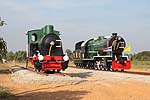 |
 |
Peter Green has sent these pictures from
his December 2011 visit to Nakhon Chaisi (west of Bangkok, near
Nakhon Pathom). It shows 263 which has been cosmetically restored
(it previously had its boiler sectioned) and a relatively new
arrival in the country, a standard gauge industrial Hanomag 0-4-0T
(6039/1912). They are reported to be part of the nearby Jesada Technik Museum -
http://www.jesadatechnikmuseum.com.The
Hanomag was sold to the museum by its previous owners, the
Süddeutsches Eisenbahnmuseum, Heilbronn, Germany, www.eisenbahnmuseum-heilbronn.de/.
(Link broken by December 2023. RD) All
this 16th December 2011. |
John Baker has sent (19th February 2005) this
fascinating story from the Bangkok Post. "Ratchaburi: After six decades lying under water, a locomotive from a Japanese military-owned train that was bombed by the Allies during World War II will be retrieved from the Mae Klong river in Muang district and put on display as a tourist attraction.
During World War II, the locomotive fell into the water when Chulalongkorn bridge was bombed by the Allies. The train was carrying weapons and supplies for Japanese soldiers and was crossing the Mae Klong river on its way to Burma.
Lt-Gen Chaiyuth Theppayasuwan, chief of the army's Engineering Department, yesterday took technicians and divers to inspect the locomotive, which they found was still in good condition but surrounded by explosives.
Each point where bombs were found would be marked and navy experts would be invited to survey the area and find ways to remove the locomotive and the explosives from the water.
The train would then be put on display. Light and sound performances after its restoration would be held at Loy Krathong every year to show that war did no good to anyone and caused only damage, death and grief."
I have since read that it is yet another C56 (7xx series 2-6-0s in later years),
note added 3rd August 2005.
Don't hold your breath time, but the new
government in Myanmar has declared its intention to rebuild the 'Death Railway'
at least from Thanbyuzyat to the Three Pagodas Pass, see http://www.irrawaddy.org/archives/4338
(Link dead by May 2023 16th May 2012). They are entering discussions
with the Thai government, one problem that will need sorting is the fact that
the original route has been submerged under the waters of a large dam on the
Thai side.
 |
I know it's not steam, but the 2Bangkok forum has some amazing
colour pictures of the trams in 1964/5 - http://2bangkok.com/category/trams
(link amended 16th December 2011). This is a sample used with permission, the original
sample disappeared from their site at one stage, beware even this index page
above has several broken links...
|
Vietnam Index
At the time when this website was established, there were a number of metre
gauge 141 class 2-8-2 steam locomotives still at work and a 131 2-6-2T and GJ
0-6-0T at Thai Nguyen Steelworks. Slowly the level of steam went down until
there was no more main line activity by the end of 2002. The reports from this period have now been moved to a
separate page. Parts of Vietnam are still a beautiful country but it seems
they won a war and lost the peace; given the mercenary attitude of the railway
and its staff, few will mourn its passing.
For a magnificent collection of more than 4000
images please see this Flickr site "Railways and Tramways of Việt Nam"
- https://www.flickr.com/photos/189316830@N03/
(12th September 2021).
As of June 2025, there is no
sign of the 'Revolution Express' launching and it must be assumed that the
project has, once again, stalled (27th June 2025).
Thomas Kautzor now tells me (12th August 2025) that 141-165 has been
transferred to 'the new R.R. maintenance facility at Kim Liên (Da Nang) for
further work. In the same movement, 141-190 continued to Ha Noi for the 80th
DSVN celebrations. Thomas visited the country in June 2025 with a view to surveying the
remaining steam locomotives. His illustrated report
is available (3rd July 2025).
|
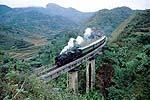
|
After the end of regular working steam, it was assumed that no further tours would be
possible. But Hans Hufnagel then reported (29th December 2003) on a change in policy from the country, however, Hans
later added (21st
May 2005) that he had been told that since no tours at all ran
in 2004, DSVN had decided not to continue to offer steam tours.
|
|

|
The Far Rail
group in March 2008 was surprisingly offered an active 141, but it failed to
materialise. However, the group did find active steam in the form of GJ
0-6-0Ts at the Thai Nguyen Steelworks reports
James Waite (13th April 2008). A recent CRJ reported standard gauge 0-6-0T
1032 active at the steel works in January 2010 (17th
August 2010). You'll need an expensive permit to visit here, Fabrice Lanoue
joined another Far Rail group in November
2010 (21st December 2010). There has been one GJ active at Thai Nguyen Steelworks
but now that is to finish according to the
FarRail Blog (15th December 2013, link dead by March 2023). According to a
tour report the official end of steam date was 22nd October 2014 (5th
November 2014).
|
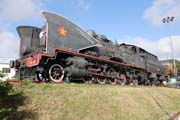
|
Surprisingly 141-158 has now turned up preserved outside the station in Ho Chi Minh City
(Saigon) reports Sebastien Schramm (27th July 2004). Now (19th
October 2023) Eddie Barnes has supplied a picture.
|
|

|
Back in 2013 Chris Newman has supplied a then recent photograph of
141-182 outside the workshops at Di An. Chris also
reports that privately owned 141-190 is still under active restoration inside,
eventually it is expected to appear on a train designed to attract
international tourists (6th February 2013). I
have since heard from a second source that the main restoration effort is
concentrated on 141-165 and that 141-190 is being cannibalised (12th
March 2013), the main remaining issue is with the boiler but in the event it
was 141-190 that was completed (first).
|
A local newspaper report, http://tuoitrenews.vn/lifestyle/23940/vietnams-first-steam-locomotive-brought-back-to-life,
relates that 141-190 has been returned to service (10th
November 2014). Another report http://en.baomoi.com/Info/Vietnams-first-revived-steam-locomotive-trial-run-a-success/3/513970.epi
link found broken on 27th October 2017 states that 141-190 has done a successful trial run (1st
January 2015), see also http://www.thanhniennews.com/travel/warera-steam-locomotive-to-connect-hue-and-danang-37035.html (1st
January 2015) (Link broken by January 2024. RD).
Ian Hopkins advised that in Bernd's
2014 posting, '206' should read '026' and that 131-428 is now on display at
Dalat station. He also reports that the long trailed steam hauled service
between Da Nang and Lang Co was due to become operational within the next 12
months. The company was looking for investors and although their website (http://revolutionexpress.com)
is currently just a shell it will have full details when ii is launched (3rd
March 2023). For an update on luxury rail excursions see https://edition.cnn.com/travel/vietage-luxury-train-vietnam-anantara-intl-hnk
(28th May 2024).
Railway Cranes (Steam and Hand) Index
Steam cranes have always been the 'Cinderellas' of the railway steam scene,
but as their more glamorous steam locomotive sisters ended their working
days, they have often continued to be active in countries with no other real
steam, but in this region the only known active survivors are in China,
Myanmar (maybe no longer, see link below), Thailand (maybe no longer with two of three confirmed converted to
diesel power) and Vietnam. You
can read more about these and other
survivors (updated 23rd January 2025).
|




















